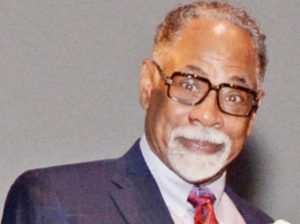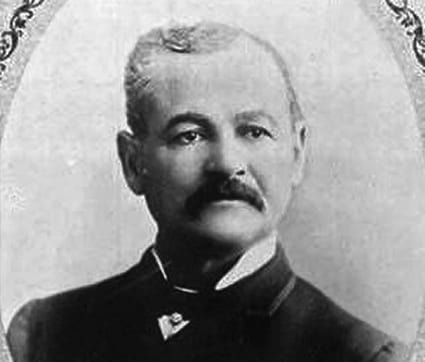by Dr. L. LaSimba M. Gray Jr., Special to The New Tri-State Defender

With a 7 p.m. parade down Beale Street to Church Park, Memphis will celebrate the birth of Robert Reid Church Sr. as a part of the Memphis Bicentennial Tuesday, June 18.
Mayor Jim Strickland will issue a proclamation that will be received by Ron Walters, general manager of WREG TV and a local historian. Mini speeches will take place and good fellowship will abound.
One hundred eighty years ago, on June 18th in Holly Springs, Miss., Robert R. Church was born to a slave girl named Emmeline and Captain Charles B. Church. Owner and operator of two of the most patronized steamboats on the Mississippi River, Church transported cargo and passengers between Memphis and New Orleans.
In 1851, Emmeline died and Robert Church was sent to live with his father on the Mississippi River. Emmeline had secured Capt. Church’s pledge that her son Robert would never be sold to another slave owner.
Sending Robert to his father was his intended passport to the North and the best education money could buy. Church bonded with his son, deciding to raise him and teach him the steamboat business.
From errand boy to steward, Robert served as an assistant to his father in many capacities, learning the principles of business, with an emphasis on bookkeeping. Capt. Church taught Robert to read and count receipts in French. A fast learner, Robert listened intently to his father’s instructions.
“Be considerate of others but always demand respect for self,” admonished Captain Church to his son. “Never allow anybody to call you a nigger.”
This hands-on education and the 11-year apprenticeship thoroughly prepared Robert for the tumultuous life he would face in the fast-growing river town of Memphis and the bustling street called Beale.
On June 6, 1862, the Civil War registered in Memphis as the Federal Fleet arrived in the Memphis Harbor with cannons blasting. Robert Church was serving as steward of the Victoria. When federal troops took over the Victoria, Robert was forced to make a decision: be killed or be captured and become a prisoner of war. Robert chose to jump into the river and swim to the muddy banks of Memphis.
With the savings from his work on the river, Robert entered business in Memphis. His first investments were in real estate and soon he expanded to hotels, pool halls, brothels, saloons and, ultimately, a bank.
Soon after the Civil War, Memphis was consumed by the Yellow Fever epidemic and the racial tensions that led to violence, death and destruction. Four days after the announcement that the plague was present in Memphis, 25,000 people fled the city. Robert Church acquired many abandoned properties, expanding on his real estate holdings. He could have left in a panic, choosing instead to contribute generously to helping Memphis recover.
African Americans remained in Memphis and by 1878 they were 70 percent of the population. African Americans constituted an overwhelming majority of the 3,000 nurses left to take care of the stricken. The entire workforce assigned by city officials to clean up the streets, bury the dead, clean up the dumps, drain the bayous, burn contaminated rags and spread lime over the vacant lots were African Americans. These heroic efforts were performed with great risk in the true sense of altruism.
The Yellow Fever Epidemic of 1878 eroded the tax base and city coffers. Memphis was unable to service a $5 million debt, adequately provide city services and pay state taxes. The city was stripped of its charter and reduced to a taxing district.
The State of Tennessee appointed Dr. D.T. Porter and David Hadden to provide leadership to the “taxing district on the bluff.” Under austere supervision and tight fiscal controls, Memphis began to rise from the ashes of devastation.
Prominent citizens debated strategies to be relieved of the debt and restore Memphis to city status. But Memphis needed investors willing to take a chance on the future. The bond market was uncertain about the potential of Memphis and most citizens were reluctant to take a chance on Memphis.
Throughout, Robert R. Church remained bullish on Memphis. In 1885, he purchased the first $1,000 municipal bond, breaking the dam of fear. By that summer, local banks and wealthy individuals purchased more than $200,000 worth of bonds. Memphis accepted responsibility for the $5 million debt and continued to rid the city of unsanitary conditions.
In 1891, the Tennessee State Legislature restored Memphis’ charter and its city designation. Two years later, Memphis was given taxing authority and home rule. That accomplishment may well be attributable to Robert R. Church for his courageous act of selflessness and his commitment to Memphis.
An editorial in the Evening Scimitar in 1899 put Church’s legacy in this context:
“It may be said of Robert R. Church that his word is as good as his bond. No appeal to him for the aid of charity or public enterprise for the benefit of Memphis has ever been in vain. He is for Memphis first, last and all the time…”
John Overton, Andrew Jackson and James Winchester founded Memphis in 1819. It is safe to say, in 1885, Robert R. Church saved Memphis.
Happy Birthday, Mr. Church; and thanks a million for Memphis and Beale Street!
(“Taking Note!” is a periodic column written by the Rev. Dr. L. LaSimba M. Gray Jr., pastor emeritus of New Sardis Baptist Church.)




